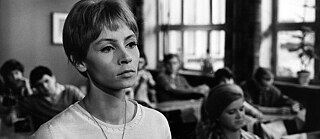Online Film Screening
Herrmann Zschoche: Karla

Goethe-Kino (Online - Only Available in the UK)
To accompany our cinema screening of the current film The Teachers' Lounge, we are showing the DEFA film Karla, which was completed in the GDR in 1965, online. In both films, young, idealistic and committed female teachers are at the centre of school conflicts that also point to wider social contradictions. However, they were made at different times and in different political systems and under the influence of different stylistic conventions and aesthetic preferences.
After completing her teacher training in Berlin, Karla Blum is posted to a small town in the north of the GDR near the Baltic Sea. Teaching a class in the year before the Abitur, she is strongly guided by the ideal of motivating her pupils to think critically, to be honest and to stand up for their believes. Although the headmaster likes and appreciates her, he observes her close relation to her pupils and the freedom of thought she allows them with scepticism. When the ideological tensions between some of the pupils and the headmaster culminate in a serious suspicion against the headmaster, Karla is forced to submit to being cautious and following the rules. The pupils react with partly genuine, partly ironic conformism, which robs Karla of all her vigour and passion.
Completed in 1965 Karla became one of the 12 films that were banned by the 11th Plenum of the Central Committee of the SED that took place in December the same year. The film's premiere did not take place until in 1990, when a version restored under the supervision of the film's cameraman Günter Ost was shown. Among other things, the film was criticised for not focusing on the "growth of the student's socialist personality" and for portraying Karla as the only person recognising the shortcomings of the system, when of course the party and government were responsible for "resolving existing contradictions". Karla is played by the well-known DEFA actress Jutta Hoffmann, who was involved in five of the 12 banned films. Her Karla is quiet but determined, sometimes sad and despondent, then again spontaneous, and full of life. The films shows her beyond the school, whereas the Carla in The Teachers' Lounge is only seen inside the school building, contributing to the film's sense of claustrophobia.
East Germany 1965 -1990, b/w, 128 min. with English subtitles.
Director: Herrmann Zschoche. Written by Ulrich Plenzdorf, Herrmann Zschoce. With Jutta Hoffmann, Jürgen Hentsch, Hans Hardt-Hardtloff, Inge Keller, Gisela Morgen, Herwart Grosse, Rolf Hoppe, Jörg Knochée (also Knoche).
About Herrmann Zschoche
Herrmann Zschoche was born in Dresden in 1934. He worked as an assistant and director of photography for the East German television news programme, Aktuelle Kamera. Zschoche studied directing at the German Film Academy in Potsdam-Babelsberg from 1954-1959 and became an assistant director to Frank Beyer (Star-Crossed Lovers, 1962).
From 1960 to 1991, Zschoche was a director at the DEFA Studio for Feature Film. His first successes were primarily children’s films, based on books by East German authors, followed by films about young people that struck a chord among the general public. Prominent themes in Zschoche’s work are the emancipation of women and the critical confrontation between young people and the older generation. His film, Bürgschaft für ein Jahr, about a divorced mother with three children, won Katrin Saß the Silver Bear for Best Actress at the 1982 Berlin Film Festival.
Karla, a film on which he collaborated with author Ulrich Plenzdorf, was banned in 1965, along with a dozen other DEFA films. Officials labeled the film as nihilistic, skeptical, and hostile. Only in 1990, after the fall of the Wall, was Karla shown in cinemas.
From 1990 until he retired in 1998, Zschoche mainly directed films for major German television stations. In 2002, he published Sieben Sommersprossen und andere Erinnerungen (Seven Freckles and Other Memories), about his experience at the East German film studios. In 2019, he was honored with the Golden Camera by the Berlin International Film Festival. (Source: DEFA Film Library)
Details
Goethe-Institut London
50 Princes Gate
Exhibition Road
SW7 2PH London
Price: Price: Free, but registration is required via Eventbrite
+44 20 75964000
info-london@goethe.de
Part of series Goethe-Kino 2024